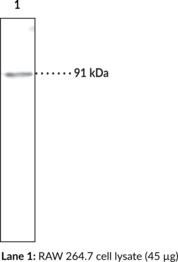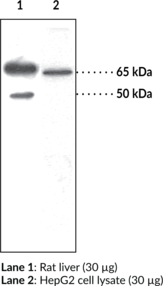Description
CD8 is a type I transmembrane glycoprotein that functions as a T cell receptor (TCR) co-receptor.{53531} It exists as an αα homodimer or αβ heterodimer and is composed of an extracellular IgV-like domain that interacts with MHC class I molecules and a cytoplasmic tail that associates with the tyrosine kinase p56Ick and mediates signal transduction to the TCR. It is expressed on the surface of, and used as a marker for, cytotoxic T lymphocytes (CTLs). CD8 is also expressed on natural killer (NK) and dendritic cells and its expression is used to characterize the development stage of thymocytes. CD8 promotes CTL-mediated killing of virally infected cells or cancer cells by binding to antigen-displaying MHC class I molecules and enhancing TCR-mediated intracellular signaling pathways.{53532} Neutralization of circulating CD8+ cells with monoclonal antibodies reduces hepatic virus elimination and decreases splenic CTL activity in a mouse model of lymphocytic choriomeningitis virus (LCMV) infection.{53533} Adoptive transfer of antigen-experienced CD8+ T cells, in combination with IL-2, reduces tumor growth and increases survival in a B16/F10 murine melanoma model.{53534} The number of circulating CD8+ T cells is increased in individuals with HIV-1 infection and is associated with stroke, ischemic heart disease, and non-AIDS-related complications.{53535} Cayman’s CD8 Monoclonal Antibody (Clone RIV11) can be used for flow cytometry (FC), immunocytochemistry (ICC), and immunohistochemistry (IHC) applications.
Synonyms:
Immunogen:
Formulation: 100 µg of Protein A-purified IgG1
Isotype:
Applications: FC, ICC, and IHC
Origin: Animal/Mouse
Stability: 365 days
Application|Flow Cytometry||Application|Immunocytochemistry||Application|Immunohistochemistry||Product Type|Antibodies|Monoclonal Antibodies||Research Area|Cancer|Immunology||Research Area|Immunology & Inflammation|Adaptive Immunity||Research Area|Immunology & Inflammation|Innate Immunity


